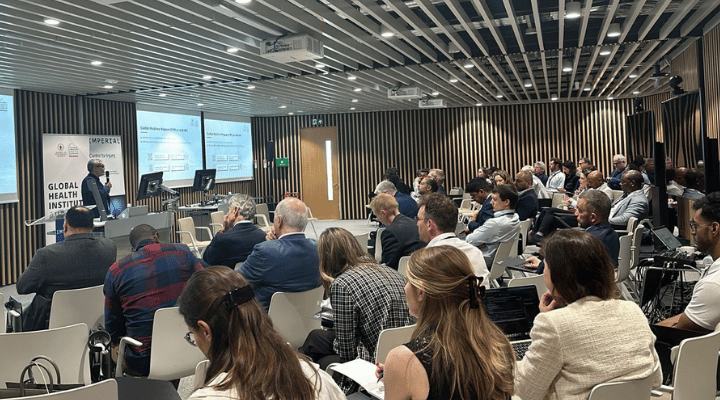GHI Holds the PrOTeCT Stakeholder Convention in London to Address Trauma-Related Challenges in War Settings
The Global Health Institute (GHI) at the American University of Beirut (AUB), in partnership with the Centre for Injury Studies (CIS) at Imperial College London (ICL) convened the 2-day PrOTeCT Stakeholder Convention 2024, titled “Engineering Health Solutions in Conflict”. The convention took place on the 20th and 21st of May 2024 in London. It brought together global actors from the private and public sector, including researchers, medical practitioners, humanitarians, biomedical engineers, and policymakers from over 30 international organizations. The convention aimed to foster evidence-based interventions, improve research-to-policy translation, and enhance the understanding of trauma in contexts of conflict.
The convention started with a welcome note from Dr. Fadlo Khuri, President of AUB, outlining the main aim of the meeting: to focus on long-terms solutions rather than immediate responses when addressing trauma-related challenges in conflict settings. Dr. Khuri highlighted initiatives undertaken by the Conflict Medicine Program at GHI and stressed the need for a model of partnership that can tackle the challenges resulting from conflict in the MENA region. Following Dr. Khuri’s remarks, Ms. Rasha Haddad, first Secretary at the Lebanese Embassy in the UK, emphasized the importance of international collaboration in research and healthcare. Dr. Shadi Saleh, Founding Director at GHI, underscored the significance of the collaborative partnership with ICL, highlighting their equal commitment to addressing global health challenges resulting from conflict, and developing contextualized solutions tailored to the needs of local communities. The second day began with remarks from ICL’s Provost, Professor Ian Walmsley, who expressed satisfaction with the previous day’s discussions and stressed the importance of taking action, noting the partnership between AUB-GHI and ICL as proof of a shared commitment to global impact.
Throughout the two days of the PrOTeCT stakeholder convention, representatives from WHO, MSF, MAP, the UK Foreign Office, and various other organizations participated in plenary sessions, panel discussions, and workshops. The emerging discipline of “Engineering Health Solutions in Conflict,” was introduced, emphasizing the importance of multidisciplinary, contextualized, and innovative approaches in addressing trauma challenges in the conflict settings.
The different sessions brought together diverse stakeholders from academia, healthcare, and humanitarian sectors to discuss effective trauma care models and the retention of expertise across conflict zones. They provided a platform for sharing practical experiences and strategies, exploring research gaps and challenges; particularly addressing data scarcity in conflict settings, and emphasizing the importance of data sharing among humanitarian organizations. Additionally, the event showcased advancements in biomedical engineering and surgical technologies, and fostered networking opportunities that encouraged new partnerships aimed at advancing conflict medicine and trauma care.
The convention also featured a compelling photography exhibition titled “Stories of War” by Giles Duley, UN’s first Global Advocate for People with Disabilities in Conflict and Peacebuilding. Giles shared his personal story of losing his limbs in Afghanistan and how he subsequently began documenting the experiences of those affected by conflict. His poignant photographs provided a powerful visual narrative of the impact of conflict on affected individuals.
The PrOTeCT Stakeholder Convention 2024 facilitated critical discussions and collaborations among international stakeholders committed to addressing trauma-related challenges in conflict settings. By emphasizing long-term solutions, fostering multidisciplinary approaches, and advocating for data-driven interventions, the convention underscored the importance of collective action in improving healthcare outcomes for populations affected by conflict.




